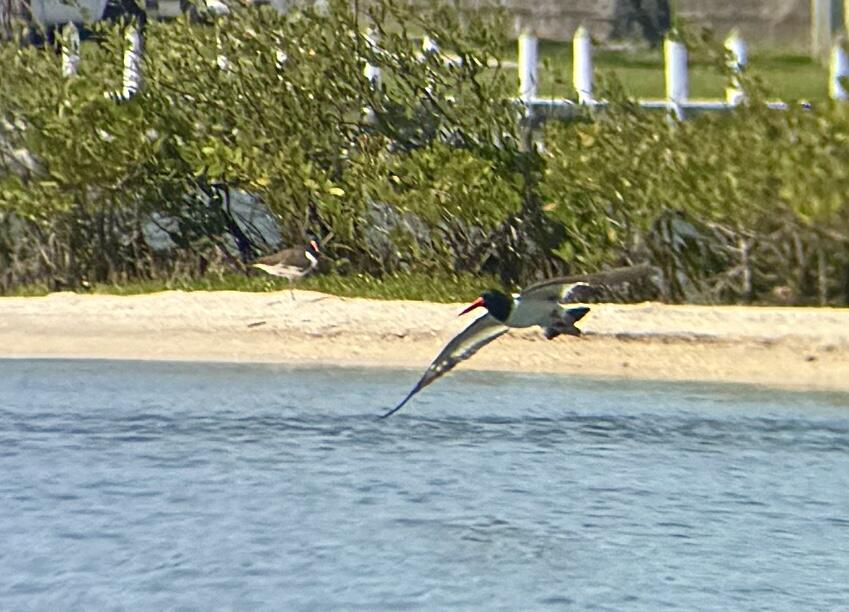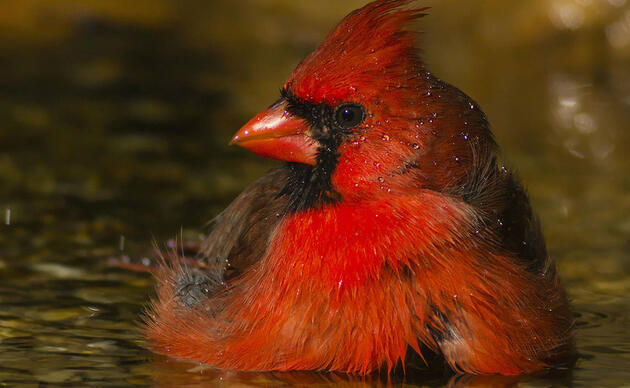
By Essie Ro, Audubon Florida Conservation Leadership Initiative (CLI) student —
As our boat coasted along the tranquil waves, the salty breeze brushed against my skin, carrying with it the salty scent of the sea and a symphony of seabird calls. Suddenly, our eyes were caught by striking black-and-white plumage and prominent, bright-orange bills, beckoning us over. Standing out against the beige shorelines, the sight of a charismatic pair of oystercatchers strolling along the sandy strip served as a glimpse into the exciting endeavors we would experience over this trip.
The alternative spring break with the Indian River Lagoon Aquatic Preserves (IRLAP) team provided CLI students like me with hands-on learning, engagement in various research and initiatives, and career-building opportunities. The IRLAP team highlighted their extensive and numerous projects aiding Florida wildlife and vegetation, while also showing us how fun they could be. These activities that IRLAP planned for us profoundly impacted my understanding of ecological preservation and the interactions between human actions and the Florida ecosystem.
On the Water
Our alternative spring break began with spending time on the waters with the IRLAP team, exploring the spoil islands of southern Brevard County. We visited BC49, a Critical Wildlife Area closed to the public. Venturing out to a small pond, we spotted lively Wood Storks, Brown Pelicans, and Roseate Spoonbills tending to their nests. Guided by IRLAP experts, we honed our skills in nest monitoring, which enabled us to see the importance of preserving a haven for wildlife that can truly be called their own. Afterward, we delved into the impact of oyster reefs, learning firsthand their role as nature's filtration system and erosion stabilizers.
Horseshoe Crabs
Alongside avian life, we also delved into the life cycles of horseshoe crabs. IRLAP utilizes acoustic telemetry, an innovative approach that involves tagging horseshoe crabs with acoustic transmitters, to track their movements. By monitoring these ancient arthropods, researchers gain a deeper understanding of their habitat preferences, movement patterns, and breeding behaviors. This valuable data then informs conservation strategies to better protect horseshoe crab populations and the coastal ecosystems they inhabit.
Native Plants
Our trip was not just about observation but also about action. Another important aspect of the trip was sprucing up the IRLAP team’s pollinator garden. The garden grows Florida-friendly vegetation that does not require much fertilizer or pesticide. These low-maintenance plants prevent runoff from flowing into the lagoon, reduce nutrient loads, and cultivate a flourishing environment for beneficial pollinators such butterflies and bees. Additionally, we used iNaturalist BioBlitz, which allowed us to identify organisms found in the garden. Tending to these green spaces not only contributed to a well-kept garden but also fostered a sense of community and connection to the land.
Microplastics
We concluded our three-day adventure with an essential research discussion while we conducted a bird stomach dissection, which underscored the urgent need to mitigate the detrimental effects of plastic on avian life. We dissected the ventriculus (gizzard) of various sea birds and recorded data if we found microplastics. By examining the contents, we gauged the extent of plastic ingestion and the impact of plastic pollution on avian populations.
All in all, the alternative spring break trip with Audubon’s CLI program and IRLAP was an enriching experience that left a lasting impression on my personal and professional growth. Seeing the diverse research and project initiatives in place made me realize my career aspirations can intersect or even align with the goals of Florida’s environmental stewardship. The trip’s hands-on activities reinforced the importance of lifelong learning in addressing complex challenges facing our state’s wildlife and ecosystem. I am grateful for the unforgettable experience that helped me to connect with nature and contribute to a more sustainable future.
Stay in Touch!
Show your love of birds today. Subscribe to receive email updates about Audubon's conservation work and hear about opportunities to help birds in your area or nationwide.




